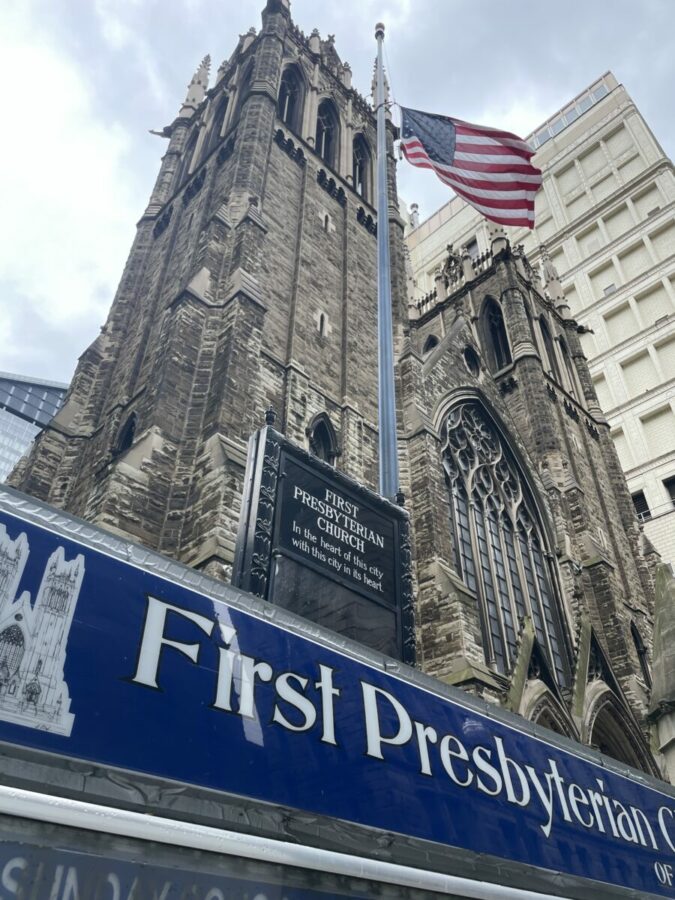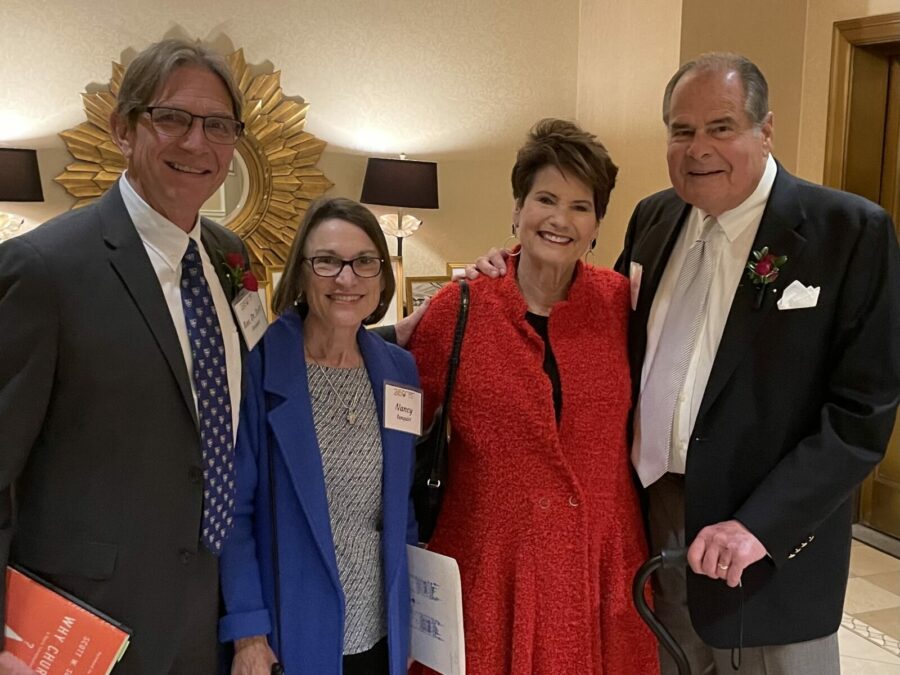Attentiveness: Engaged Evangelicalism
This past Sunday my wife Nancy and I sat at a table at the William Penn Hotel in Pittsburgh with former Gordon-Conwell Board chair Rev. Dr. John Huffman and his wife Anne. He and I were invited as two of the speakers to celebrate the 250th anniversary of the iconic and influential First Presbyterian Church of Pittsburgh. As I found out, the church is one of the many with a great history that is closely connected to Gordon-Conwell.
 First Presbyterian was founded in 1773, just 15 years after the French were forced out from Fort Duquesne, thus setting the stage for the creation of the new British city of Pittsburgh. Both First Presbyterian and Trinity Episcopal Cathedral were built on land donated by the family of the Quaker pioneer William Penn. For 250 years, through the Revolutionary War, Industrial Revolution, the Steel Era, American Missionary Movement, and the modern student ministry movements[1] First Presbyterian has provided a home and a home base for outreach both locally and around the world.
First Presbyterian was founded in 1773, just 15 years after the French were forced out from Fort Duquesne, thus setting the stage for the creation of the new British city of Pittsburgh. Both First Presbyterian and Trinity Episcopal Cathedral were built on land donated by the family of the Quaker pioneer William Penn. For 250 years, through the Revolutionary War, Industrial Revolution, the Steel Era, American Missionary Movement, and the modern student ministry movements[1] First Presbyterian has provided a home and a home base for outreach both locally and around the world.
In doing some research for my talk, I found out how much this important church is related to Gordon-Conwell and our support for an evangelical theology that engages the world.
The stream of theology First Presbyterian has proclaimed over the past century is resonant with our own heritage as a seminary. Rev. Clarence McCartney was pastor from 1927-1953. Raised in the Reformed Presbyterian Church in North America—a more conservative part of the Presbyterian family from Scotland—McCartney briefly attended Harvard and Yale before finding the more conservative teachings of B.B. Warfield at Princeton. Soon McCartney was involved in the Fundamentalist-Modernist controversy opposing the “modern” new teachings of Harry Emerson Fosdick.[2] However, McCartney stopped short of becoming a schismatic (briefly supporting the new seminary in Philadelphia, Westminster) and remained within the Presbyterian Church in the USA.
Avoiding schisms, when possible, but upholding the unadulterated Gospel of Christ in the broader society captures the essence of his theological approach: an engaged evangelicalism.
One of the younger pastors McCarney mentored was the youthful Harold Ockenga. Their five-year association in Pittsburgh was formative for our first seminary president who earned a PhD at the University of Pittsburgh during his time of ministry.
Another close connection for Gordon-Conwell is that in 1973, our Board member Billy Graham delivered the main address when First Presbyterian celebrated its 200th anniversary. The new pastor who was called to lead the church was another of our Board members, Rev. John Huffman, just 35 years old at the time.
 So, this past Sunday, Nancy and I sat with John and Anne reminiscing about the history of this distinguished church. Perhaps more importantly, we talked about the people and relationships that mark its story and the importance of both good theology and concrete practice for local congregations in the United States today.
So, this past Sunday, Nancy and I sat with John and Anne reminiscing about the history of this distinguished church. Perhaps more importantly, we talked about the people and relationships that mark its story and the importance of both good theology and concrete practice for local congregations in the United States today.
I realize that much of this tradition is part of the larger Reformed family which Gordon-Conwell continues to serve among other traditions. These leaders over this century served as a bridge for those who resisted the liberal or modernizing trends, but who likewise also resisted the isolating impulse of fundamentalism. Engaged evangelicalism is a good way of describing folks like McCartney, Ockenga, Huffman, and Graham: engaged in the issues of our time while upholding the undistilled power and beauty of the Gospel of Jesus Christ, unchanged and powerful.
As I return to Boston, I have been thinking of the many ways Gordon-Conwell is a place of engaged evangelicalism. We uphold our high view of Scripture as part of our mission and our rigorous scholarship through participation in the Boston Theological Interreligious Consortium, where I serve as the Chair of the Board. Scholars like Dr. Adonis Vidu prepare students to engage in issues of postmodernism in their churches, and our counseling faculty like Dr. Karen Mason do research on pressing issues of depression and suicide. And in the near future, we will celebrate a thoroughly biblical way forward on racial issues with a worship service for the covenant agreement signed with Black church leaders in Boston. Upcoming DMin programs in higher education leadership, as well as a cohort for Chinese pastors and another for Korean pastors, also are indications of our engagement in cultures and contemporary issues.
I believe that such engaged evangelicalism is based on our understanding of Christology. Christ is all in all.
“He is the image of the invisible God, the firstborn of all creation; for in him all things were created, in heaven and on earth, visible and invisible, whether thrones or dominions or principalities of authorities—all things were created through him and for him.” Colossians 1:15-16
[1] Modern student ministry movements include Young Life, InterVarsity, and Coalition for Christian Outreach.
[2] McCartney’s response to the liberalism of Fosdick was through writings and leading the Presbyterian denomination to challenge Fosdick and to his resigning his pulpit in 1924.
 Dr. Scott W. Sunquist, President of Gordon-Conwell Theological Seminary, is author of the “Attentiveness” blog. He welcomes comments, responses, and good ideas.
Dr. Scott W. Sunquist, President of Gordon-Conwell Theological Seminary, is author of the “Attentiveness” blog. He welcomes comments, responses, and good ideas.
